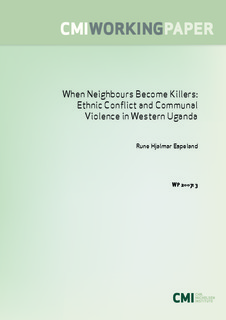| dc.description.abstract | Across Africa land rights conflicts are escalating between indigenous and migrant ethnic groups. This paper analyses the communal violence that took place in connection with an ethnicised land redistribution in Western Uganda in 2004. The paper specifically employs the term communal violence to analyse a situation where neighbours became killers. Since the concept is rarely used in African ethnography, the paper draws on theoretical developments and empirical contributions concerning communal violence in South Asia.
Looking at the wider political context, the paper traces the processes from conflict to communal violence. It argues that rather than being irrational and incomprehensible, communal represented a particular form of meaningful action. It foregrounds the role of rumours to show how when ethnicised they play a vital part in the formation of a common moral imagination as well shaping the direction of social processes between ethnic groups. The paper argues that rumours are not simply a response to ethnic contention but constitutive of it. Moreover, this constitution is productive of communal violence.
This paper is based on fieldwork conducted in Kibaale District, Uganda during the spring of 2003. | |
